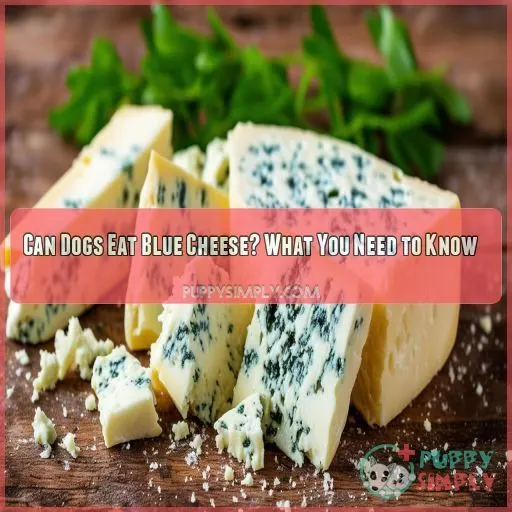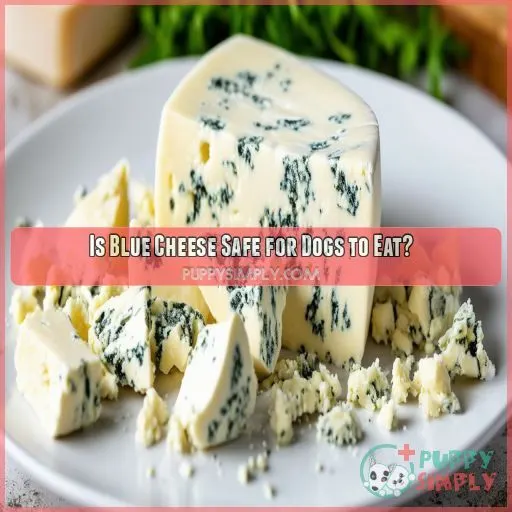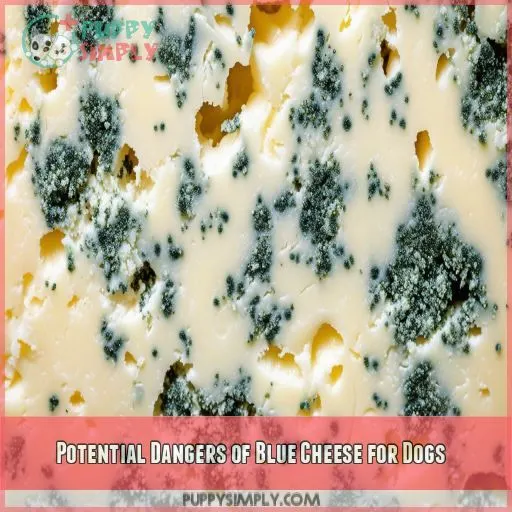This site is supported by our readers. We may earn a commission, at no cost to you, if you purchase through links.
 You might be wondering: can dogs eat blue cheese?
You might be wondering: can dogs eat blue cheese?
The answer is a cautious no.
Blue cheese contains roquefortine C, a substance toxic to dogs, which can cause digestive upset and other symptoms of illness.
It’s important to know which human foods are safe for dog consumption, so read on to learn about the potential dangers of blue cheese for your furry friend and how to act if they eat some accidentally.
Table Of Contents
- Key Takeaways
- Can Dogs Eat Blue Cheese?
- Is Blue Cheese Safe for Dogs to Eat?
- Potential Dangers of Blue Cheese for Dogs
- Other Cheese Varieties to Avoid Giving to Dogs
- What to Do if Your Dog Eats Blue Cheese
- Seeking Veterinary Care for Blue Cheese Ingestion
- Can Dogs and Cats Consume Blue Cheese?
- Considering Alternatives: Healthier Cheese Options for Dogs
- Consulting Your Veterinarian for Dietary Advice
- Frequently Asked Questions (FAQs)
- What happens if my dog eats blue cheese?
- What cheeses should dogs avoid?
- What to do if my dog eats blue cheese reddit?
- Can dogs and cats eat blue cheese?
- How much blue cheese is too much for dogs?
- Are there long-term health issues associated with blue cheese consumption in dogs?
- Are there any health benefits to dogs from blue cheese?
- Why is blue cheese toxic, unlike other cheeses?
- Can blue cheese be used as a training treat?
- Conclusion
Key Takeaways
- Blue cheese is a no-go for our furry pals; it’s like giving them a ticking time bomb.
- If your dog accidentally has a taste, watch closely for signs of an upset stomach or worse.
- There are plenty of alternative cheeses dogs can enjoy, such as cheddar or cottage cheese.
- Always consult your vet if you’re unsure about your dog’s diet; they are experts in keeping our furry friends healthy and happy.
Can Dogs Eat Blue Cheese?
While blue cheese isn’t toxic to dogs, it’s not recommended. Although it won’t cause serious harm, it can lead to health issues like vomiting and diarrhea due to a mold-derived compound and dairy content.
If your dog has eaten blue cheese, monitor them closely. To avoid potential health risks, opt for dog-safe cheeses like cheddar or cottage cheese.
Continue to find out more about the potential dangers and what to do if your dog has already eaten blue cheese.
Is Blue Cheese Safe for Dogs to Eat?
The answer is a resounding no. While blue cheese isn’t toxic to dogs, it’s best to avoid giving it to your furry friend due to the presence of roquefortine C, a substance that can cause vomiting, diarrhea, and even tremors. This mold-derived compound is unique to blue cheese and poses potential health risks to dogs, so it’s better to be safe than sorry.
Additionally, blue cheese is a dairy product, and some dogs may have difficulty digesting dairy, leading to stomach upset. If you’re considering treating your dog to a cheesy snack, there are safer alternatives, like cottage cheese, which is low in lactose and packed with protein and calcium. Cheddar cheese is another good option and can even be used as a training treat in small cubes.
When it comes to your dog’s diet, it’s always a good idea to consult with your veterinarian, especially if you’re unsure about a particular food item. They can provide specific advice and make sure your pup maintains a healthy and balanced diet.
Potential Dangers of Blue Cheese for Dogs
Blue cheese can pose risks for your dog due to the presence of roquefortine C, which can lead to symptoms like vomiting, diarrhea, and tremors. Additionally, the rich nature of blue cheese may cause digestive issues, so it’s important to monitor your dog closely if they’ve ingested some.
Roquefortine C Toxicity
Roquefortine C, a mycotoxin found in blue cheese, can be harmful to dogs.
While blue cheese itself isn’t toxic, the natural compound roquefortine C, produced by the Penicillium roqueforti mold, gives it its distinctive flavor and poses risks to canine health.
If your dog consumes blue cheese, monitor them closely for any signs of distress, including vomiting, diarrhea, tremors, or seizures. These symptoms indicate a potential toxicity issue, and you should seek immediate veterinary care.
Digestive Upset
In addition to the dangers of Roquefortine C toxicity, blue cheese can also cause digestive upset in dogs due to their sensitivity to dairy products. While not all dogs will react the same way, some common issues include:
- Lactose intolerance
- Dairy allergies
- Diarrhea
- Vomiting
Monitoring for Symptoms
Monitoring Lily’s symptoms is paramount after her blue cheese escapade. While she might just experience an upset stomach, you need to watch for more severe reactions.
Observe Lily for symptoms like vomiting, diarrhea, muscle tremors, or seizures. These could indicate poisoning from roquefortine C in blue cheese. If any symptoms appear, contact your vet immediately. Early intervention is key to ensuring Lily’s safety.
Other Cheese Varieties to Avoid Giving to Dogs
Now that you’re aware of the dangers blue cheese poses to dogs, it’s important to know that there are other cheese varieties that should also be avoided. Here’s a list of cheese types that aren’t suitable for your furry friend:
- Cheeses with added extras: It’s best to steer clear of cheeses that have ingredients like chives, onions, or garlic added to them. These extra ingredients can be harmful to dogs and cause digestive issues.
- Cream cheese: While plain cream cheese is generally safe in small amounts, it’s important to be cautious. Some cream cheeses contain those added extras mentioned above, which can be problematic. Always check the ingredients list before offering any to your pet.
- Cheese with a high lactose content: dairy intolerance is a common issue for dogs, and cheeses with a high lactose content can trigger digestive problems. Opt for low-lactose options like cottage cheese instead.
What to Do if Your Dog Eats Blue Cheese
If your dog eats blue cheese, it’s important to stay calm and take proactive steps to guarantee their safety. While blue cheese isn’t toxic to dogs, it can cause digestive issues due to its rich content and the presence of roquefortine C. Here’s what you should do:
- Monitor your dog closely: Keep a vigilant eye on your dog’s behavior and physical condition for the next 2-3 hours. Observe their mucus membranes, capillary refill time, and respiratory rate. These crucial signs can indicate potential health issues.
- Be aware of digestive consequences: Large portions of blue cheese may lead to mild vomiting, diarrhea, or other digestive upset. Stay attentive to these potential symptoms and be prepared to take appropriate action.
- Consider dietary alternatives: Discuss safe food options for your dog with your veterinarian. There are various types of cheese, such as cheddar and cottage cheese, that can be offered in moderation as nutritious treats.
Seeking Veterinary Care for Blue Cheese Ingestion
If your dog has ingested blue cheese, it is crucial to monitor them closely. While blue cheese isn’t inherently toxic to dogs, it can still cause digestive upset, especially in large quantities.
Keep a close eye on your dog’s mucus membranes, capillary refill time, and respiratory rate for any changes.
If you notice any symptoms such as vomiting, diarrhea, tremors, or seizures, seek veterinary attention without hesitation.
Some foods that are safe for human consumption can be dangerous for dogs, so it is important to be vigilant about what your dog consumes.
Can Dogs and Cats Consume Blue Cheese?
Unfortunately, I don’t have any information on cats and blue cheese. However, here is some more information on dogs and blue cheese:
- Blue cheese isn’t toxic to dogs, but it may cause digestive issues due to the difficulty in digesting dairy.
- It contains roquefortine C, which can lead to vomiting, diarrhea, and even tremors or seizures in more severe cases.
- If your dog ingests blue cheese, monitor them closely for any symptoms for 2-3 hours, paying attention to their mucus membranes, capillary refill time, and respiratory rate.
- Consult your veterinarian if you notice any adverse reactions or have any concerns.
Considering Alternatives: Healthier Cheese Options for Dogs
Regarding feeding your dog cheese, cheddar is generally the best choice as it’s low in lactose. Cottage cheese can also be a good source of protein and calcium for your canine companion, but you’ll want to avoid giving them blue cheese, as it contains a toxin that can make dogs sick.
Cheddar: Best Option
While blue cheese is a no-go due to the risks of blue cheese toxicity and roquefortine C, cheddar cheese is a safer option for your dog. You can offer it as a training treat, cutting it into small cubes. Just remember, as with any treat, moderation is key.
Cottage Cheese: Good Source
While cheddar is the best option, cottage cheese is also a beneficial food for dogs.
It is a great source of protein and calcium and is low in lactose, making it easy for dogs to digest.
You can mix cottage cheese with other foods, but avoid those with added salt, as this can be harmful to dogs.
Avoid Blue Cheese
While some cheeses are safe for dogs to consume, blue cheese isn’t one of them. Here’s why you should avoid giving blue cheese to your canine companion:
- Blue Cheese Mold: Blue cheese is made with Penicillium Roqueforti, a type of mold that produces Roquefortine C, a toxin that can be harmful to dogs.
- Toxicity Symptoms: Roquefortine C toxicity can lead to vomiting, diarrhea, tremors, and even seizures in dogs. These symptoms can occur within a few hours of ingestion.
- Canine Health Risks: Even if your dog doesn’t show immediate signs of toxicity, regular consumption of blue cheese can negatively impact their long-term health due to the mold’s toxic effects.
- Dairy Intolerance: Like many dogs, your pup may also have difficulty digesting dairy products, which can result in stomach upset, gas, and diarrhea.
It’s best to steer clear of blue cheese altogether and opt for safer cheese alternatives, such as those mentioned in the previous section. Your dog’s health and well-being are paramount, so always exercise caution when introducing new foods into their diet.
Consulting Your Veterinarian for Dietary Advice
While it’s helpful to know which cheeses are safe for dogs, it’s also important to consult a veterinarian for specific dietary advice. Veterinary nutritional guidance is an essential aspect of pet health management. Every dog is unique, and individualized pet care guarantees that their specific needs are met.
Veterinarians can provide expert advice on dietary considerations for dogs, taking into account factors such as age, breed, weight, and any health conditions your dog may have. They can offer guidance on appropriate portions, nutrient requirements, and potential food sensitivities or allergies.
For example, if you have a senior dog with kidney issues, your veterinarian might recommend a diet lower in phosphorus, which is commonly found in dairy products. Or, if your dog struggles with obesity, they may suggest low-calorie treats and portion control.
Regular check-ups and consultations with veterinary experts are key to guaranteeing your dog maintains a healthy weight and receives the necessary nutrients for their overall well-being. Remember, regarding your dog’s diet, it’s always best to seek professional advice to keep your furry friend happy and healthy.
Frequently Asked Questions (FAQs)
What happens if my dog eats blue cheese?
If your dog eats blue cheese, it might cause an upset stomach. Blue cheese contains roquefortine C, which can lead to vomiting, diarrhoea, and even seizures. It’s like a ticking time bomb in their tummies. So, monitor your dog closely and seek veterinary advice if needed.
What cheeses should dogs avoid?
Dogs should avoid blue cheeses, like Roquefort, Gorgonzola, and Stilton, which contain a toxin that may be lethal. Cheeses with herbs, garlic, or other seasonings should also be avoided.
What to do if my dog eats blue cheese reddit?
If your dog has eaten blue cheese, monitor them for any symptoms for 2-3 hours. Keep an eye on their mucus membranes, capillary refill time, and respiratory rate. If symptoms develop, seek veterinary attention.
Can dogs and cats eat blue cheese?
It’s a no-go for dogs and cats. It’s like offering your furry friend a dangerous, potentially toxic treat. While it mightn’t always cause issues, it’s best to avoid blue cheese altogether and opt for safer, pet-friendly alternatives.
How much blue cheese is too much for dogs?
The amount of blue cheese that’s too much for dogs depends on their size and what else they’ve eaten that day. Even a small piece can be dangerous. The high fat content can lead to pancreatitis and obesity.
Are there long-term health issues associated with blue cheese consumption in dogs?
No, there are no long-term health issues associated with blue cheese consumption in dogs. However, blue cheese can cause immediate physical symptoms like vomiting and diarrhea.
Are there any health benefits to dogs from blue cheese?
There are no health benefits to dogs from blue cheese. It can lead to vomiting, diarrhea, and even seizures.
Why is blue cheese toxic, unlike other cheeses?
Blue cheese can be toxic to dogs due to the presence of a substance called Roquefortine C, which is produced by bacteria as the cheese ripens. This toxin can cause a range of symptoms, including stomach upset, vomiting, and seizures.
Can blue cheese be used as a training treat?
No, blue cheese shouldn’t be used as a training treat.
Conclusion
Ultimately, it’s best to avoid giving your dog blue cheese. This is due to the presence of roquefortine C, which can cause digestive issues and other health problems.
There are plenty of other cheese options that are safer for your furry friend. Some examples are cheddar or cottage cheese.
If your dog accidentally consumes blue cheese, monitor them for any symptoms. Seek veterinary advice if you’re concerned.














